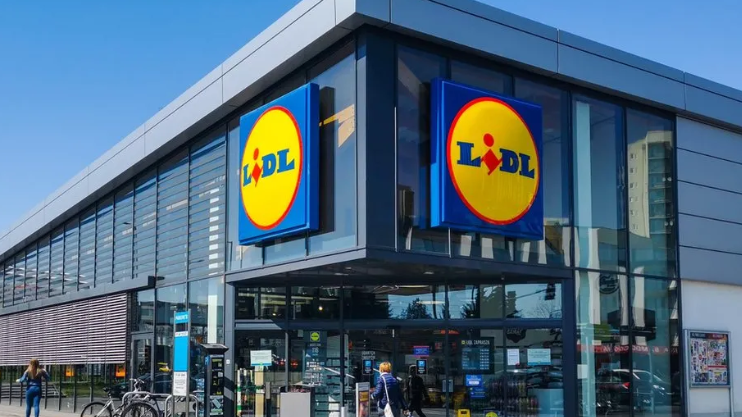Lidl raises pay to match Aldi in battle for staff

- Published
Lidl has increased basic wages for its workers, bringing them into line with its discount rival Aldi.
The supermarket will lift pay per hour to £12.40 for those outside greater London and £13.65 for employees within the M25 motorway.
It means that both German discount chains now pay more than the major supermarket groups in the UK.
Lidl's new rate comes into force at the beginning of June, the same day as Aldi.
Lidl UK's chief executive, Ryan McDonnell, said that the supermarket was expanding and "it’s absolutely right, therefore, that we continue to offer industry-leading pay”.
It recently announced that it would build new stores in Bristol and Birmingham, as well as new sites in London.
The National Living Wage, which is set by the government, rose from £10.42 to £11.44 in April and was expanded to include workers over 21 rather than over 23 years-olds.
The main supermarkets all pay above the minimum wage - typically offering rates of more than £13 an hour for people inside greater London and at least £12 for those outside.
For example, Tesco gives its staff £12.02 or £13.13 an hour depending on where they work.
Faisal Islam: Economy is getting better but people may not notice
- Published10 May 2024
John Lewis and Co-op announce pay rises for staff
- Published6 March 2024
Tesco latest supermarket to increase staff pay
- Published5 March 2024
The Bank of England keeps a close eye on wages when deciding whether to cut or raise interest rates.
If it is difficult to fill vacancies, businesses may pay more to attract workers but it could mean firms raise prices on their products to cover bigger wage bills. This in turn could cause inflation to stay higher for longer.
On Thursday, the Bank of England said that it would "consider forthcoming data releases", believed to mean job figures and inflation to assess whether "the risks for inflation persistence are receding".
It kept interest rates at 5.25% but appeared to edge closer to a cut in the summer.
The estimated number of job vacancies in the UK has continued to drop to 916,000 between January and March, according to the Office for National Statistics.
However, they remain 120,000 above pre-Covid levels in the first three months of 2020.
Wage growth has been slowing but it climbed at an annual pace of 6% between December and February, still far above inflation which rose to 3.2% in the year to March.
That is also above the Bank of England's 2% inflation target.